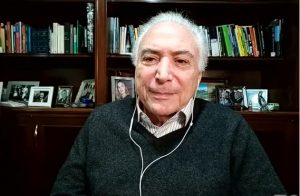São Paulo – The Lebanese-Brazilian Community’s Humanitarian Aid Group has raised 60 more tons of donated items that should be sent to Beirut until next Tuesday (25), according to Instituto Kanoun (Association of Jurists of Lebanese Origin) president Ricardo Maluf. He talked during the webinar featuring former Brazilian president Michel Temer, who helmed the Brazilian humanitarian mission to Lebanon on the 13th following the Beirut Port tragedy on August 4.
“We have donated items, money, medicines, food. We now have over 60 ton’s worth of supplies stored and ready to be sent, just waiting some minor decisions to be taken over the next 24 hours,” Maluf said during the online event. The webinar was hosted by the Lebanese-Brazilian Community’s Humanitarian Aid Group and organized by the Arab Brazilian Chamber of Commerce (ABCC). The event got over 800 viewers.
Lebanese-Brazilian Medical Association president Robert Sami Nemer (pictured above) said that they need to move on to the implementation phase of everything that the humanitarian aid group has discussed. “We are on this phase now. We have many tons of items, particularly medicines, to be taken to Lebanon, and I’d like that they would be sent this week, before Wednesday or Thursday, with the help of [former] president. And we will keep up the effort, as our Lebanon deserves more than that,” he said in the webinar.

Nemer said that several hospitals in Beirut were damaged and that the association wants to help in some way. He made a request to the former president Michel Temer during the webinar. “We notice that the Brazil medicine is poorly recognized in Lebanon, and I’d like ask the Brazilian government to help in this regard, to take this sad opportunity to put Brazilian medicine in Lebanon as an exchange of information or even a medical humanitarian aid. We want the government’s support to break into Lebanon as Brazilian cutting-edge medicine,” he said.
Former president Temer said that he will forward to request to president Jair Bolsonaro and acting Health minister Eduardo Pazuello. “It is key to promote our advanced medicine and helping Lebanon. I will convey your message to the Health minister,” Temer said.
Nemer made another request to the former president. “In addition to the donations, we could make a campaign of the free samples that every doctor receives. We could raise tons of free samples, but we need a facility to store them and take them there. I’d like the [former] president’s help, if possible,” he said.
Temer said that he will do his best to help deliver everything that could go to Lebanon. “I’m sure the government will help for these medicines to arrive there,” he said.

Ricardo Maluf said it is fundamental to keep raising donations to Lebanon right now. “We should remember and keep the fire burning, for a medium- and long-term work that is already being conceived by the leaderships,” he said.
Maluf asked Temer how Brazil has helped Lebanon besides the donations. Temer said that he met with Lebanese Maronite, Shiite, Sunni and Druze religious leaders. “In addition to the humanitarian aid, I considered it a bold move to ask our diplomatic representative to call the religious leaders, who have an undeniably great influence power. What we want is peace in Lebanon, and this peace can also come from the religious preaching. Brazil is more than willing to help. We have a great affective, cultural connection to Lebanon, and we can help in that. I’ve been stressing that our diplomats express themselves constantly. The French, Russians and Americans are there offering their help, saying they will sponsor the pacification in Lebanon, and Brazil can’t stand by the sidelines. The Brazilian diplomacy must go down this road, too,” Temer said.
Featured speakers included Lebanon’s ambassador to Brazil, Joseph Sayah; ABCC president Rubens Hannun; Brazil-Lebanon Chamber of Commerce president Alfredo Cotait Neto; FAMBRAS Halal president Mohamed Zoghbi; and Brazil-Lebanon Chamber of Commerce secretary-general Guilherme Mattar. The webinar was moderated by ABCC secretary-general and CEO Tamer Mansour.
The Lebanese-Brazilian Community’s Humanitarian Aid Group was formed following the Beirut Port blast and includes several entities and associations, such as the Arab Brazilian Chamber of Commerce, Brazil-Lebanon Chamber of Commerce, Federation of Muslim Associations of Brazil (FAMBRAS), Instituto Kanoun, Federation of Industries of the State of São Paulo (FIESP), Lebanese-Brazilian Medical Association, the city of São Paulo, the Federal Government, Hospital Sírio Libanês, Mesquita Brasil, Clube Atlético Monte Líbano, Lebanon’s Embassy in Brasília, Hospital do Coração (Hcor), Christian Lebanese Diaspora Foundation (FCDL), Muslim Beneficent Society, National Islamic Union (Uni) e Esporte Clube Sírio.
More reports on the webinar soon.
You can watch the full event here:
Translated by Guilherme Miranda




